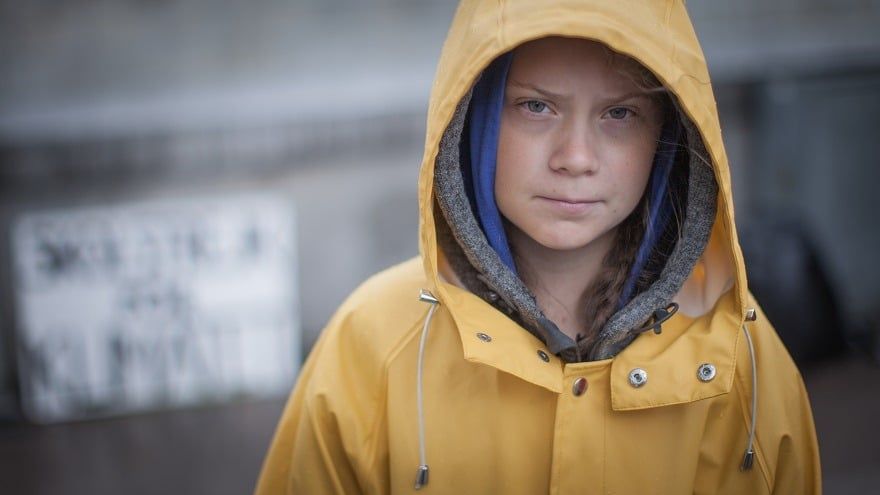The eloquence of Greta Thunberg
By Thomas Gaulkin | April 25, 2019
 The global climate strike movement began in August 2018 with Greta Thunberg's weekly protest outside the Swedish parliament. Photo: Anders Hellberg
The global climate strike movement began in August 2018 with Greta Thunberg's weekly protest outside the Swedish parliament. Photo: Anders Hellberg
Greta Thunberg, the 16-year-old student whose school strikes have inspired a global youth movement on climate change, has emerged as a chief orator of her generation, enthralling her Instagram peers and world political leaders alike while taking on new and more specific opponents.
That includes the members of Parliament she met with this week in London. Her speech Tuesday to a gathering of British MPs was remarkable, not only for the incongruity of a young Swedish woman giving the UK’s top politicians what for, but also for her focused targeting of the nation’s energy policies. Longer than her usual talks—at some 1,750 words it’s more than double the length of speeches she presented at Davos and the UN climate conference in the fall—the speech eschewed the finely tuned repertoire of scolding that propelled her into newscasts worldwide with persuasive and provocative headline-fodder like “I want you to panic,” “the house is on fire,” “I don’t want your hope,” and so on.
Instead, for her House of Commons speech, as with her address to the EU parliament a week earlier, Thunberg tailored her words to the climate-related failures of the adults in the room. “The UK is … very special,” she told the British MPs. “Not only for its mind-blowing historical carbon debt, but also for its current, very creative carbon accounting.” She then detailed how the UK’s carbon emissions reductions have fallen short (by neglecting emissions from aviation and shipping in estimates, for example). Lambasting the nation’s continued support for fossil fuels, Thunberg does not mince words: “This ongoing irresponsible behavior will no doubt be remembered in history as one of the greatest failures of humankind.”
Thunberg has adjusted her rhetoric to respond to criticism from prominent figures like Theresa May (who was a no-show at a meeting between Thunberg and other UK party leaders), who think the school strikes “waste lesson time.” As for those winning metaphors like the “house on fire,” Thunberg seems confident moving beyond them (“I have said those words before,” she told the EU) to newly relevant and bigger metaphors: “Avoiding climate breakdown will require cathedral thinking. We must lay the foundation while we may not know exactly how to build the ceiling.”
It’s worth reading Thunberg’s entire speech, to appreciate both her crisp eloquence on the world’s most complex environmental problem and her satisfying rejection of grown-ups who praise her actions without committing to any themselves.
“Did you hear what I just said?” she asked a few times. “Is my English OK? Is the microphone on? Because I’m beginning to wonder.”
Publication Name: The Guardian
To read what we're reading, click here
Together, we make the world safer.
The Bulletin elevates expert voices above the noise. But as an independent nonprofit organization, our operations depend on the support of readers like you. Help us continue to deliver quality journalism that holds leaders accountable. Your support of our work at any level is important. In return, we promise our coverage will be understandable, influential, vigilant, solution-oriented, and fair-minded. Together we can make a difference.
Keywords: Greta Thunberg, climate strikes, parliament
Topics: Climate Change, What We’re Reading
















I find her view radically upholding the true science, what is unpalatable to the capitalist agents / puppets.
she’s awesome, never heard hear lie and even found out about putting nuclear waste in fracking wells from researching her statement that i didn’t agree with
Yes, what a pity we in the UK do not have her as PM and not the mean spirited PM and
the crazy Brexit-loving Tories. Greta has real leadership qualities sadly lacking in today’s MPs.